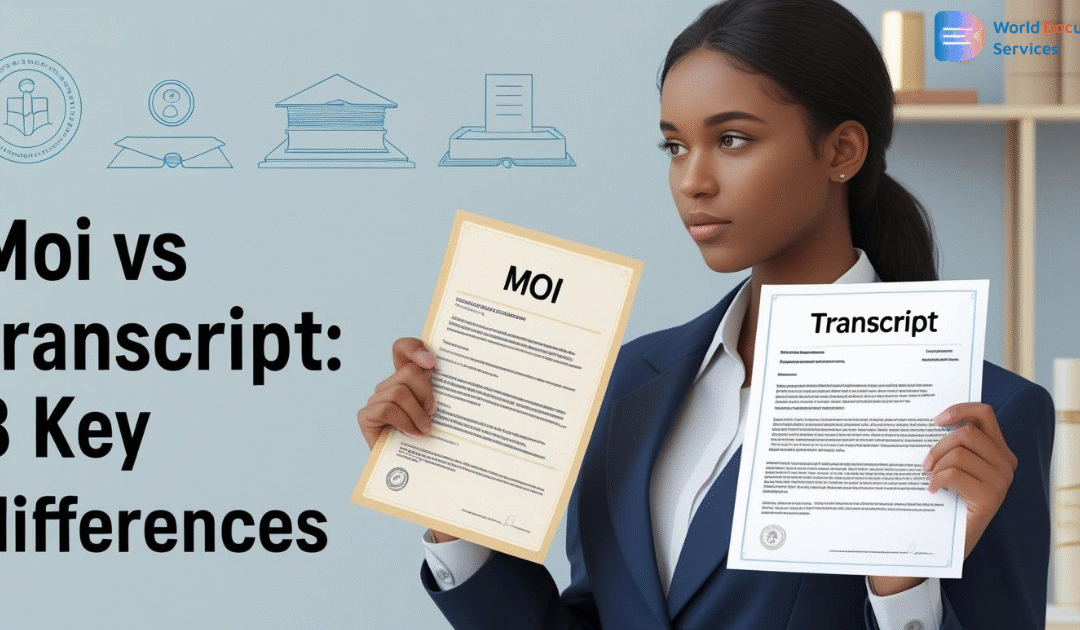
by World Document Services | Jul 17, 2025 | Most Viewed, Transcripts Services
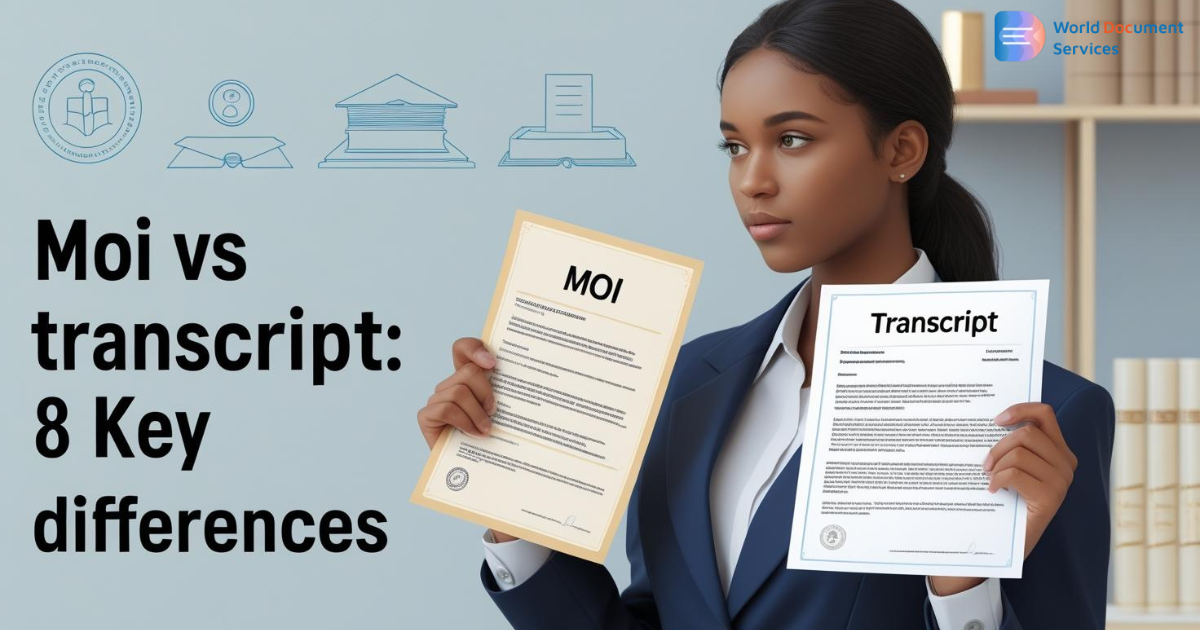
In the professional and educational field, it is necessary to verify educational credentials. Among the most important elements of such verification are the Medium of Instruction (MOI) certification and transcript authenticity verification. While both are proof of academic credentials, each plays a different role, with varying requirements and repercussions.
Need help with your MOI certification and transcript authenticity verification? Contact Us Now!
This article examines the eight key differences between MOI certifications and transcript authenticity, giving students, professionals, and employers insight into their relevance.
1. Definition and Purpose:
The Medium of Instruction (MOI) certificate is a certificate issued by an educational institution to confirm the language in which the student is educated. It is typically demanded for international university admission or visa applications for the purpose of demonstrating proficiency in a specified language, most often English.
In comparison, transcript authenticity verification ensures whether a student record is original and not tampered with. The verification is required for employment, higher education, or immigration.
2. Authority to Issue:
MOI certificates are issued by the educational institution where the student has completed their studies. It is generally provided by the university’s administration or the registrar’s office upon request. However, in the case of an autonomous institute, it is directly issued by the institution itself.
The authenticity of the transcript is confirmed by the issuing university or by official credential evaluation agencies. This is part of the process of university transcript authentication, whereby the authenticity of the academic records is confirmed.
3. Requirement for Verification:
In the MOI certificates, verification is generally straightforward. The school only confirms that the student has studied in the given language.
Authentication of the transcript, however, requires a strict document authentication process. Employers, institutions, and credential evaluation organizations check for any evidence of forgery, inconsistent grades, or inconsistencies in the record.
4. Purpose in Immigration and Higher Studies:
Some immigration authorities, as well as many international universities, require an MOI certificate in the absence of the results of standardized tests such as IELTS or TOEFL in order to determine English proficiency.
In contrast, transcript authenticity verification is typically mandated by educational credential assessment (ECA), which further evaluates whether a foreign degree in another country is equivalent. This is particularly pertinent for immigrants planning to go to countries like Canada, the US, and Australia.
5. Sections of the Document:
An MOI certificate typically includes the following information:
- The student’s name
- The course or program title
- The mode of instruction
- The university seal and signature
A transcript certificate or certified transcript consists of:
- Comprehensive grade-wise subjects.
- Credit hours.
- Awarded degree.
- Date of graduation.
- University seal and authorized signatures.
6. Evaluation by Credentialing Agencies
While MOI certificates may be recognized by international institutions, they are not always a primary document for equivalency in higher education. They may be used to support an application, but are by no means always required.
Authenticity verification of the transcript, however, is part of the educational credential evaluation process. Institutions, including WES (World Education Services) and ECE (Educational Credential Evaluators), evaluate international academic and professional recognition for transcripts.
7. Acceptance by Employers and Universities
Universities and employers typically request transcript authenticity for formal verification of academic credentials. An MOI certificate alone is not confirmation of degree completion.
However, an MOI certificate may be useful when applying for language-specific jobs or admissions in which English proficiency certification is the requirement in place of language exam results.
8. Time Required for Processing and Cost
It is quicker and less costly than the certification of transcripts. Universities generally take a few working days to produce MOI certificates, sometimes for free or for a nominal charge.
University transcript verification procedures can take several weeks. Additional charges may be necessary for verification services, courier services, and independent evaluation.
FAQs
Q: Can I use an MOI certificate instead of an English language proficiency test?
A: Yes, a number of universities and immigration agencies accept MOI certificates as proof of English proficiency, although the requirements vary by institution and by country.
Q: How long will it take to authenticate the transcripts?
A: The transcript verification process can take anywhere from several weeks to only a few days, depending on the verification agency and the institution.
Q: Is transcript authenticity verification mandatory for job applications?
A: Although it is not always required, most employers ask for transcript authenticity verification for senior positions to ensure academic credentials are genuine.
Q: Do MOI certificates come from any university?
A: Most institutions provide MOI certifications, though the policies differ. It is best to check with the administrative office of the university.
Q: What happens if my transcript is found to be unauthentic?
A: If a transcript fails the transcript authenticity verification process, employment, immigration, or university applications can be rejected, and legal actions can be taken in the case of fraud.
Conclusion
While MOI certificates and transcript authenticity verification both serve significant purposes in the professional and academic fields, each serves a different purpose. MOI certifications are primarily for the purpose of language of instruction identification, while transcript authenticity verification verifies the authenticity of academic records. Having knowledge of the difference can help students and professionals make it through admissions, employment applications, and immigration procedures with ease.
Download the World Document Services App
You may enjoy a hassle-free experience by downloading our mobile app from either the App Store or the Play Store. It works with both iOS and Android devices.
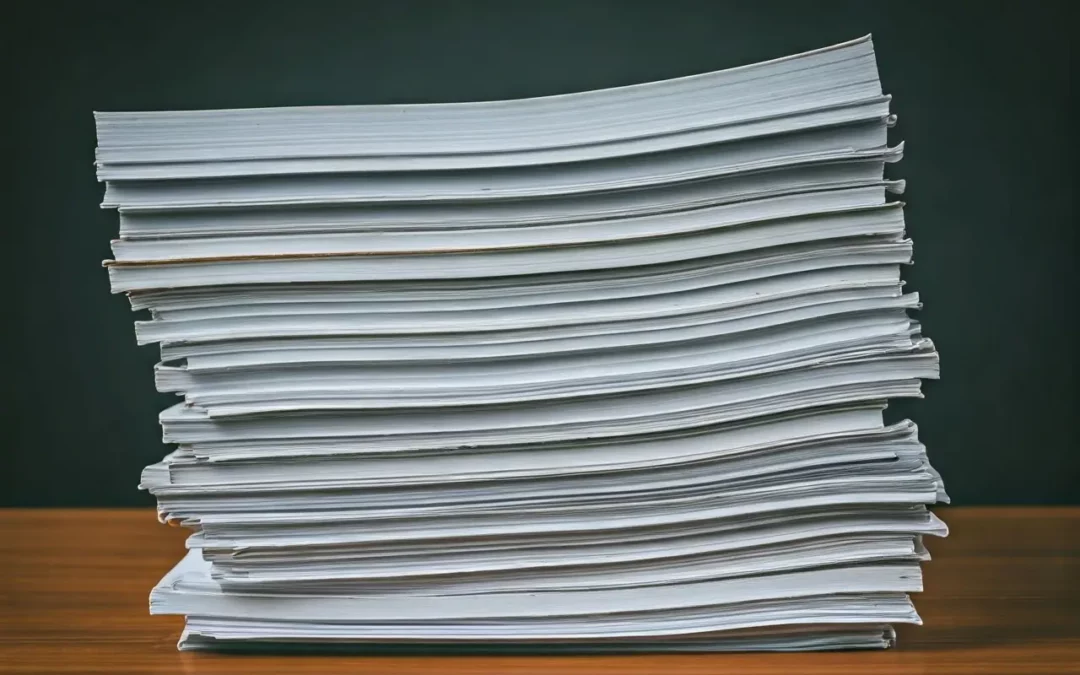
by Shipra Choudhary | Apr 14, 2025 | Educational Documents, Most Viewed

When one wants to study or work abroad, documentation is essential. Along with a bunch of other things to be submitted, there is one thing that raises many eyebrows—the MOI certificate. What is the full form of MOI? What does the MOI certificate mean connected to your work/studies abroad? Read on for a simple breakdown of everything you need to know about the MOI certificate, the MOI full form, and how to acquire one.
Need help with your Medium of Instruction Certificate? Contact Us Now!
What is the Full Form of MOI? Meaning in detail
MOI stands for Medium of Instruction. A Medium of Instruction certificate is an educational document which is provided by a respectable educational institution conforming the language through which the course was taught. For example, if you are an international student who completed your course in English, you will be granted a Medium of Instruction Certificate asserting that your course is completed in English.
This is imperative for people applying to various international countries or international companies where English may not be the day-to-day mode of communication but the language of higher studies and employment opportunities.
Read more: Can Medium of Instructions Affect My Migration Process?
Why is the MOI Certificate Required?
The following are reasons why more international colleges/universities are asking for an MOI certificate along with other documentation:
1. University Admissions Internationally
Many international institutions require an MOI for university admissions. Countries such as Germany, Canada, and the Netherlands—much of Europe—need documentation that you have studied the English language to determine your ability to learn and therefore, be accepted. The MOI acts as an alternative to the IELTS or TOEFL examinations that all international students tackling a second language must sit for.
2. University Admissions Internationally with MOI
If you wish to pursue your Master’s or Doctorate in a language other than English, your new institution may overlook the requirement for an English examination if you possess an MOI certificate. Also, your goal to pursue higher education with an English program, it will show you can and have done so in another educational setting. Essentially, your MOI facilitates your application and reduces processing time and additional costs—for an English exam.
3. Employment or Immigration Requirements
Similarly, those who must prove their English proficiency for international employers or immigration offices may require an MOI certificate, too. Citizens of countries where their primary language of instruction is not English may need you to show proof that you are good at communicating and comprehending the English language if their required documentation states such a necessity.
When is the MOI Certificate Required?
- Application to foreign colleges that will accept an MOI as a proof of an English proficiency exam.
- Visa or immigration application requirements that seek proof of the language utilized.
- Foreign job opportunities that seek proof of the language of instruction or medium of education.
- During the processing of applications by evaluators like WES, ECE, etc.
How to Obtain an MOI Certificate from Your College/ University
If you’re wondering how to get an MOI certificate, it is actually quite easy. Here are the steps:
Step 1: Reach Out to Your College/University
Contact your registrar or student records department. Most colleges and universities have an idea of how to process an MOI certificate request.
Step 2: Submit Your Request
You will need to process a formal request with the following information:
- Full name
- Enrollment number
- Degree title and course length
- Reason for request (i.e., higher education abroad)
Some colleges might have a prescribed template for MOI certificates, some might have you write a request letter.
Step 3: Pay the Fees
Most colleges only charge a nominal fee to issue such a letter. Be sure to keep a record of payment.
Step 4: Get the MOI certificate
This takes from a few days to a few weeks. Upon receipt, it will state your course, the duration of the course, and the medium of instruction . This will most probably be English.
What Does an MOI Certificate Include?
An MOI certificate should include the following:
- Name of the student
- Name of course/program
- Duration of the course
- A letter of confirmation that states the course was completed in English (or other language)
- Signature and stamp of college/university authority
The MOI Verification Process: Why? When? How?
Many foreign universities require an MOI verification process to validate that the certificate is genuine. This is typically done through:
1. Direct Verification
Here, universities directly mail your previous college /university on their own to confirm whether MOI is true or not!
2. Third-party Services
Agencies like WES, ECE, IQAS, etc. will reach out to your university, if necessary, when you present your MOI instead of English proficiency tests.
3. MOI Certificate Attestation
If you’re moving to a Gulf nation (UAE/Saudi/Kuwait/etc.), the MOI certificate requires attestation. This means the certificate needs to be attested by your university, then HRD department, then the Ministry of External Affairs, and then the respective nation’s embassy.
Attestation signifies that the document is true and legitimized by overseas powers.
MOI vs. English Proficiency Tests: Which is Better?
Both have their own advantages and disadvantages as MOI Certificate is convenient but it’s not acceptable everywhere around the world. So, now let’s compare it with traditional English tests:
| Feature |
MOI Certificate |
IELTS/TOEFL |
| Cost |
Usually minimal |
Can be expensive |
| Availability |
Easy to get from your university |
Requires booking in advance |
| Acceptance |
Not accepted by all universities |
Widely accepted worldwide |
| Validity |
Permanent |
Typically valid for 2 years |
If we talk about mental health or stress levels of a student, most of the students prefer using the MOI for university admission to avoid the stress of exams, while others take English proficiency tests for broader acceptance.
Countries That Accept the MOI Certificate
Here is a compiled list of countries that are known to accept MOI certificates:
- Germany – Many universities accept it as proof of English proficiency for select courses.
- Canada – Some universities and colleges will waive IELTS/TOEFL, if you present the MOI.
- Netherlands – Multiple universities accept MOI from Indian colleges/universities.
- Italy & Spain – Generally accept MOI in addition to other paperwork for master’s.
- UAE & Qatar – Require attestation of MOI certificate for employment and visa.
But always check with the University or embassy beforehand as policies can vary.
Common Problems with MOI for Students
Luckily, the process of applying for an MOI is overwhelmingly transparent; however, students might face some speed bumps along the way:
- Universities take a long time to send an MOI due to backlog or administrative mistakes.
- Incorrect information on the certificate like wrong length of course, missing signatures.
- Acceptance denial from international universities who don’t recognize MI as an equivalent to English testing.
- Problems with MOI verification, especially if the university doesn’t respond to the certifying agency.
The best way to avoid any issues is to apply for the MI nice and early and validate information upon application.
Best ways to use your MOI
- Always evaluate the potential new university’s requirements before assuming they will accept an MOI.
- Use as a companion with other forms of documentation like a transcript.
- Get your MOI attestation — applying for jobs or education to countries that require attestation.
- Make digital and hard copies of your MOI certificate for future use.
Read more: 7 Key Steps to Authenticate Medium of Instructions for Your Transcripts
Final Thoughts
The MOI certificate could be a mere slip of paper, but within the complex realm of employment opportunities, immigration, and overseas education, it can do wonders. Just like platforms such as wolfwinner.bet offer opportunities to explore new experiences online, MOI certificates open doors in the real world for global academic and career journeys. Understanding what MOI is all about, how to get it and use it can save you money, time, and effort when it comes to your overseas experience for education or employment.
If you’re ever unsure about your university or country considering MOI for international higher education, reach out to the official website or a reliable documentation specialist.
And remember—setting your intentions and having the proper documentation is the first step to opening up international possibilities!
Download the World Document Services App
You may enjoy a hassle-free experience by downloading our mobile app from either the App Store or the Play Store. It works with both iOS and Android devices.
Frequently Asked Questions (FAQs)
Q: What is the MOI full form?
A: MOI stands for Medium of Instruction.
Q: What does an MOI certificate state?
A: It states the language in which you were instructed during your studies, which typically will be English.
Q: Can I use MOI for university admission abroad?
A: Yes, the majority of universities accept the MOI certificate as proof of English language proficiency; however, it’s best to confirm with your university.
Q: Do I need to attest my MOI certificate?
A: Yes. If you’re traveling to the UAE for further education or work, it is necessary. MOI certificate attestation provides an international stamp of approval.
Q: How long does it take to get an MOI certificate?
A: MOI certificates can be obtained within 1-3 weeks based on your university’s turnaround time.
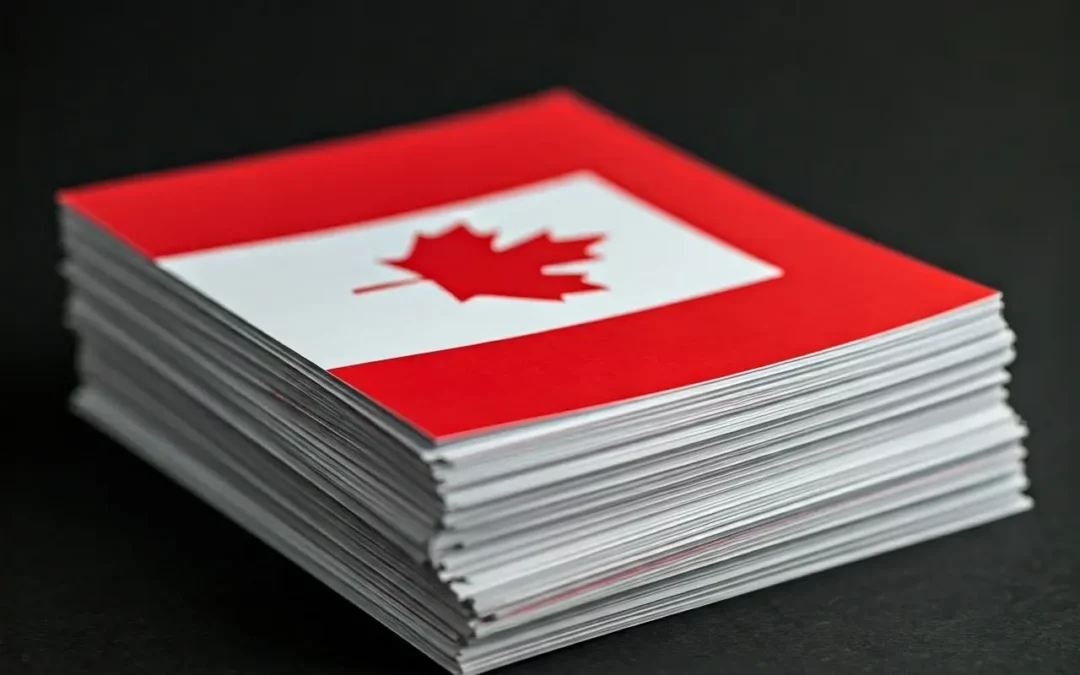
by Shipra Choudhary | Jan 17, 2025 | Credential Evaluations, Most Viewed
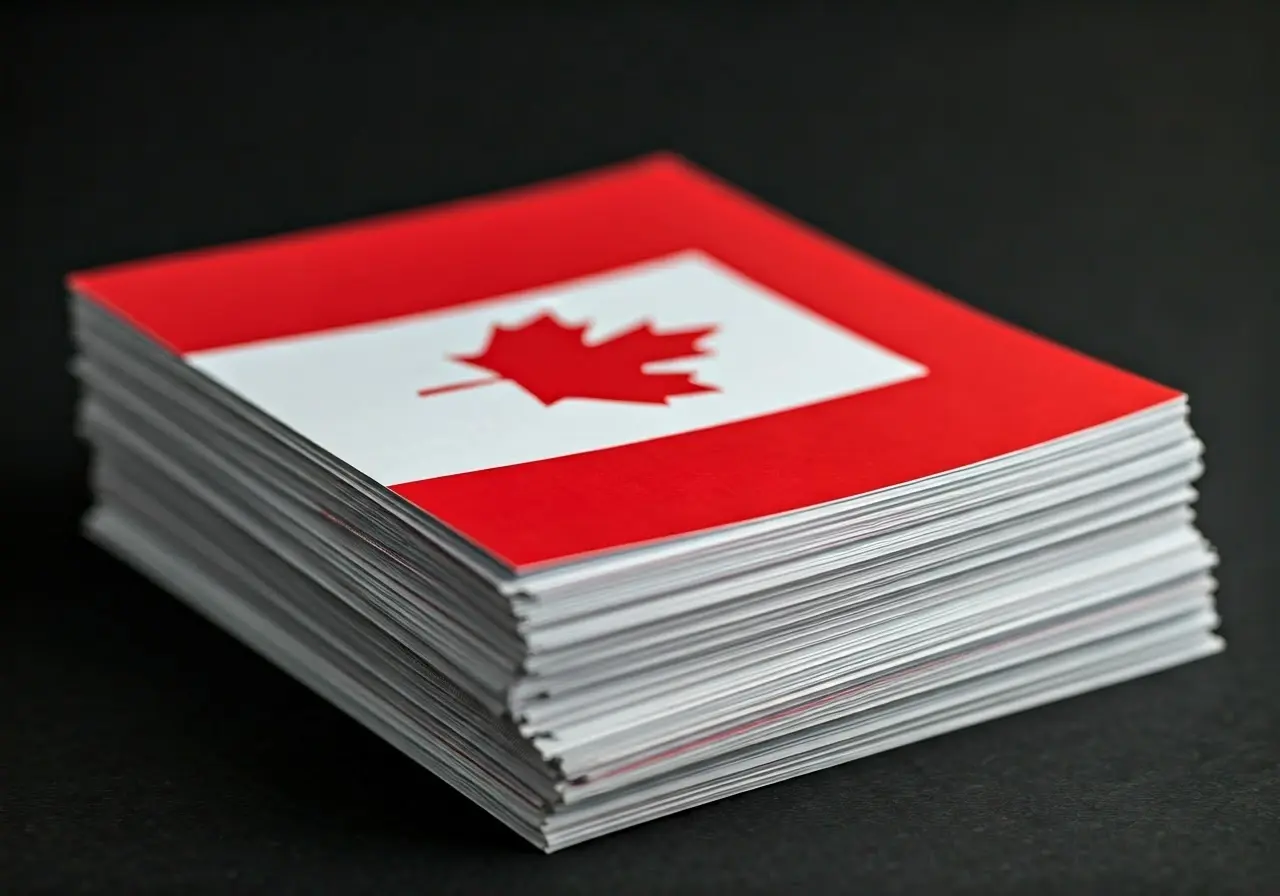
For Canadian students planning to study abroad or seeking to validate their educational background, understanding the process of acquiring the Medium of Instruction (MOI) certificate is crucial. This document plays a significant role in various academic and professional scenarios. This FAQ explores the MOI process specifically for Canadian students, answering common questions and providing a step-by-step guide.
Need help with your MOI Certificate? Contact Us Now!
Today, in a world where globalisation is everywhere, the transfer of knowledge and skills across borders is becoming more common, especially for Canadian students who want to continue their studies or pursue employment opportunities abroad. Verifying the validity and authenticity of a student’s qualification in academia is really important. One crucial document to consider is the Medium of Instruction (MOI) Certificate. This document will explore the MOI procedure and provide an explanation of its importance, specifically in the case of Canadian students.
What is a Medium of Instruction (MOI) Certificate?
The MOI Certificate is a formal document issued by a university or college that certifies the language that is used in instruction for a student throughout their entire academic career. English or French serves as the main medium of instruction. The MOI confirms this part of the student’s educational experience.
The certificate is usually needed for evaluations of academic credentials as well as admission to universities in foreign countries, and even professional certificates are needed in cases where evidence of proficiency is required. With an MOI certification, students are able to save time and money that could otherwise be devoted to taking separate proficiency tests.
Read more: 10 Things You Didn’t Know About Migration and Convocation Certificates: What is MOI’s Role?
Why Do Canadian Students Need an MOI Certificate?
Canadian students require an MOI certification for a variety of reasons:
- Admissions to International Universities: Many universities around the world require evidence of the instruction language, so the MOI makes this easier and is a great option for Canadian students.
- Credential Evaluation: Services such as WES (World Education Service) and IQAS (International Qualifications Assessment Service) frequently request the MOI document.
- Professional Specifications: Some licensing organisations or employers from abroad might require documents proving proficiency in the language in order to facilitate communication while working.
- Visa Application: Sometimes, the MOI certificate is a necessary document to process visa applications.
Step-by-Step Guide to the MOI Application Process for Canadian Students
In order to obtain an MOI certificate, you must follow these steps; a comprehensive description of the MOI process is given below:
1. Identify the Issuing Authority
The initial step is to find out which office in your institution manages the issue of the MOI. In general, the following offices are responsible for this procedure:
- Registrar’s Office
- Academic Records Office
- Student Services
2. Prepare the Required Documents
Before filling out the form, you must gather all necessary documentation to facilitate an easy process. This should include:
- Copy of your transcript or degree
- An ID issued by the government to verify identity
- Application form
- Receipt for payment
3. Submit the MOI Application
The MOI application procedure can generally be submitted online and even offline if you want to. You need to follow the given steps:
- Log into your university’s portal for students or visit the university, particularly the designated office.
- Complete the MOI request form and provide precise information.
- Upload or attach the necessary documents.
- Be sure to pay the applicable charges.
4. Processing Time
After your application has been submitted and is accepted, the institution will then process your request. The processing time can be different:
- Certain institutions will provide the MOI certification within 2 to 3 working days.
- Other requests could take as long as 2 weeks, based on the number of enquiries.
5. MOI Document Submission
Once you have obtained the certificate, be sure that it is submitted to the right organisation. In this case, for example, For credential evaluation, you must send MOI straight to an evaluating organisation (e.g., WES or IQAS).
Common Challenges in the MOI Process and How to Overcome Them
The MOI process is generally simple, but you can encounter these challenges:
1. Processing Delays:
Problem: The high quantity of requests may cause delays.
Solution: Fill out your application early and then follow up frequently.
2. Document Submission Issues:
Problem: Any mistakes in document submission may lead to the MOI being rejected.
Solution: You need to check the details about the entire process needed for submission with your receiving organisation.
3. Incomplete Applications:
Problem: Documents that have missing or inaccurate information can cause delays in processing.
Solution: Make sure you double-check the application prior to submitting.
4. Institution-Specific Requirements:
Problem: Some universities use specific forms or processes for issuing an MOI.
Solution: You can contact your university’s Department of Registrar for more specific instructions.
Importance of Professional Assistance in the MOI Process
For students who are finding the MOI processing difficult or lengthy, expert assistance is a great resource. At World Document Services, we have a team of experts who will be there to help Canadian students through the documentation process, which includes:
- Assistance in MOI applications
- Monitoring compliance with university requirements and organizational requirements
- Offering complete support in the evaluation of credentials and legalization of documents
Through our partnership, you will be able to save your time and energy, ensuring that the documents comply with international requirements.
Read more: MOI Certifications: Bridging the Gap in Cross-Border Education Validation
Conclusion
The MOI process is a key element in the lives of Canadian students who are looking to be successful on the international stage in the professional and academic arenas. For admissions, credential tests, or even for professional use, getting the Medium of Instruction Certificate is a simple but important process.
If you need assistance with the MOI application process, document submission, or any other documentation needs, visit us at World Document Services. Help us to help you meet your educational and professional goals effortlessly!
Download the World Document Services App
You may enjoy a hassle-free experience by downloading our mobile app from either the App Store or the Play Store. It works with both iOS and Android devices.
MOI for Canadian Students: Frequently Asked Questions (FAQs)
Q: Can I use an MOI certificate instead of a language proficiency test like IELTS or TOEFL?
A: Yes, there are many institutions that recognise a MOI certificate to prove proficiency in a language. Always verify this with the particular institution you’re applying to.
Q: What is the cost of obtaining an MOI certificate?
A: The cost varies by university. Many universities will offer the certificate at no cost, while others might charge a small amount.
Q: How long is the MOI certificate valid?
A: In general, an MOI certificate does not have an expiry date. However, some institutions might need a recently issued certificate.
Q: Can I apply for an MOI certificate after graduation?
A: Most universities allow alumni to apply for the MOI certificate. Check with your university for specific alumni procedures.
Q: What should I do if my MOI certificate contains errors?
A: The issuing authority should immediately be contacted to ask for an updated version.







 Call Us
Call Us Mail Us
Mail Us WhatsApp
WhatsApp
